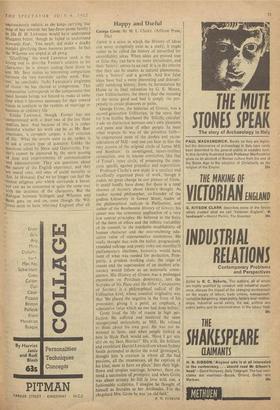. - Happy and Useful
IHERE is a sense in which the History of Ideas can never completely exist as a study; it ought rather to be called the history of unverified (or unverifiable) ideas. When ideas are proved true or false they can have no more vicissitudes, and their 'history' comes to an end it is in the interim that they can he studies as natural phenomena, with a 'history' and a growth. And few false ideas have had a more interesting and dramati- cally satisfying history, from its formulation by Hume to its final refutation by G. E. Moore, than Utilitarianism, the theory that the meaning of the terms good and bad is simply the pro- pensity to create pleasures or pains.
George Grote, the historian of Greece, was a second-generation Utilitarian, in the sense that for him (unlike Bentham) the 'felicific calculus' n ade no distinction between one's own pleasures and pains and those of other people. In most other respects he was of the primitive faith— he experienced none of the doubts and recon- siderations of Mill—and one can hear in him the very accents of the original circle of James Mill and Bentham: its unmitigated, steam-intellect rationalism, and its intense conviction, like that of Freud's inner circle, of possessing the corn- piete specific against prejudice and superstition.
Professor Clarke's new study is a succinct and excellently organised piece of work, though it makes no great change in our picture of Grote. It could hardly have done, for there is a total absence of mystery about Grote's thought. As banker turned philosopher, co-founder of the godless University in Gower Street, leader of the philosophical radicals in Parliament, and
uthcir of the Benthamite History of Greece, his career was the systematic application of a very few central principles. He believed in the fixity of the form of ethics and the infinite variability of its content, in the indefinite modifiability of human character and the overwhelming edu- cative value of representative institutions. He really thought that with the ballot. progressively extended suffrage and yearly (why not monthly?) parliamentary elections, humanity would have most of what was needed for perfection. Pros- perity, a prudent working class, the reign of reason and the supersession of an insolent aris- tocracy would follow as an automatic conse- quence. His History of Greece was a prolonged encomium on Periclean democracy, and the Socrates of his Plato and the Other Companions of Socrates is a philosophical radical of the Utilitarian kind, whose essential originality was that 'He placed the negative in the front of his procedure; giving it a point, an emphasis, a substantive value which no one had done before.'
Grote lived the life of reason in high per-
fection. He suffered and mastered the same occupational melancholy as Mill. He refused to think about his own past. He was not in- terested in fame, and when people looked at him in Hyde Park would ask, 'Have I got any dirt on my face, Harriet?' His wife, the brilliant and exorbitant Harriet Lewin (from whom Sydney Smith pretended to derive the word `grotesque'), thought him 'a creature in whom all the bad passions, all the meannesses, all the caprices of his kind, seem to have no place.' Into their high- flown and utopian marriage, however, there en- tered a succession of protegees, and when Grote was about seventy he fell in love with one, a fashionable sculptress. I imagine he thought of himself as Socrates to her Alcibiades. For the chagrined Mrs. Grote he was 'an old fool.'
P. N. FURBANK










































 Previous page
Previous page